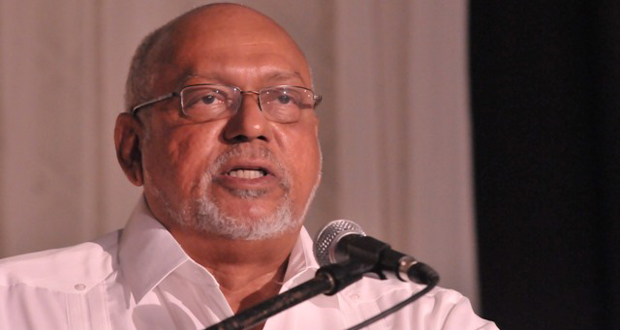Texeira: Clerk is the ‘gatekeeper’ of Parliamentary procedures
November 3, 2014, Source - Guyana Chronicle

PRESIDENT Donald Ramotar has directed that steps be taken to convene a sitting of the National Assembly within the next 14 days.
And Presidential Advisor on Governance and Government Chief Whip, Ms. Gail Teixeira, contends that the Clerk of the National Assembly, Mr. Sherlock Isaacs, is the “gatekeeper” of parliamentary procedures.

Her comments followed statements by House Speaker, Mr. Raphael Trotman, who told the Guyana Chronicle that he is not “bound” by the advice of the Clerk of the National Assembly, who denied his request for a sitting of the Assembly on November 6.
Asked to comment on the matter, Teixeira agreed with this contention, but stressed that Isaacs is obligated not to allow a breach of the Standing Orders, which according to him, places the power to call a sitting, under the current circumstances, with the Central Government.
“The Clerk is the person who advises on parliamentary procedures and business of the House and, yes, while the Speaker does not have to take the clerk’s advice,” Texeira said, adding:
“…the Clerk is obligated to protect the Standing Order of the Parliament, to ensure that they are being applied correctly. He is the gatekeeper of the Parliament, and therefore the Speaker may be making a point, but he has to consider the other side of it….the Clerk cannot do something to breach the Standing Order.”
According to her, the definition of the Speaker’s role is clearly defined. “It may be true that the Speaker does not have to rely on the Clerk, but the other side of the coin is that the Clerk is obligated to ensure that the Standing Orders are not breached,” she said.
CONTRAVENTION OF STANDING ORDER
The Government Chief Whip pointed out that the fact that the Speaker requested a sitting, found him in contravention of the Standing Order.
“In the letter from the Speaker he requested that the Clerk set a date, but under what Standing Order was that request made. No orders allow him to make such a request. As such, the Clerk cannot accept a request or instruction that would go against the Standing Orders,” she said.
Teixeira stressed that Standing Order 8 sets out clearly the guidelines for calling a sitting of the House.
Standing Order 8 addressed the grounds on which sittings are called and states clearly where the authority to call such a sitting lies.
The ‘Ordinary Sitting of the Assembly’ is addressed in Standing Order 8 (1), which says: “(1) Save as otherwise provided by the Constitution or resolved by the Assembly upon a motion moved by a Minister, the Assembly may sit every day except Saturdays and Sundays and, unless the Assembly otherwise decide, every adjournment of the Assembly shall be to the next Sitting day.”
Standing Order 8 (2), ‘Sitting convened at the discretion of the Speaker’, adds that: “(2) If, during an adjournment of the Assembly, it is represented to the Speaker by the Government, or the Speaker is of the opinion, that the public interest requires that the Assembly should meet on a day earlier than that to which it stands adjourned, the Speaker may give notice accordingly and the Assembly shall meet at the time stated in such notice. The Clerk shall as soon as possible inform each Member in writing, or telegram or by appropriate electronic means of any such earlier meeting.”
Attempts to contact the main Opposition’s Chief Whip, Ms. Amna Ally, proved futile.
Speaker Raphael Trotman
Additionally, the Government, since the President’s call for a sitting, has reiterated its position that the convening of a sitting of the National Assembly must be done in accordance with the Standing Orders and long cherished parliamentary practices. The Government had a number of pending legislative matters to be brought before the House prior to the annual recess. Further there are important financial papers relating to the development of the country and growth of the economy that need to be urgently addressed.
Source - http://guyanachronicle.com/tex...amentary-procedures/



